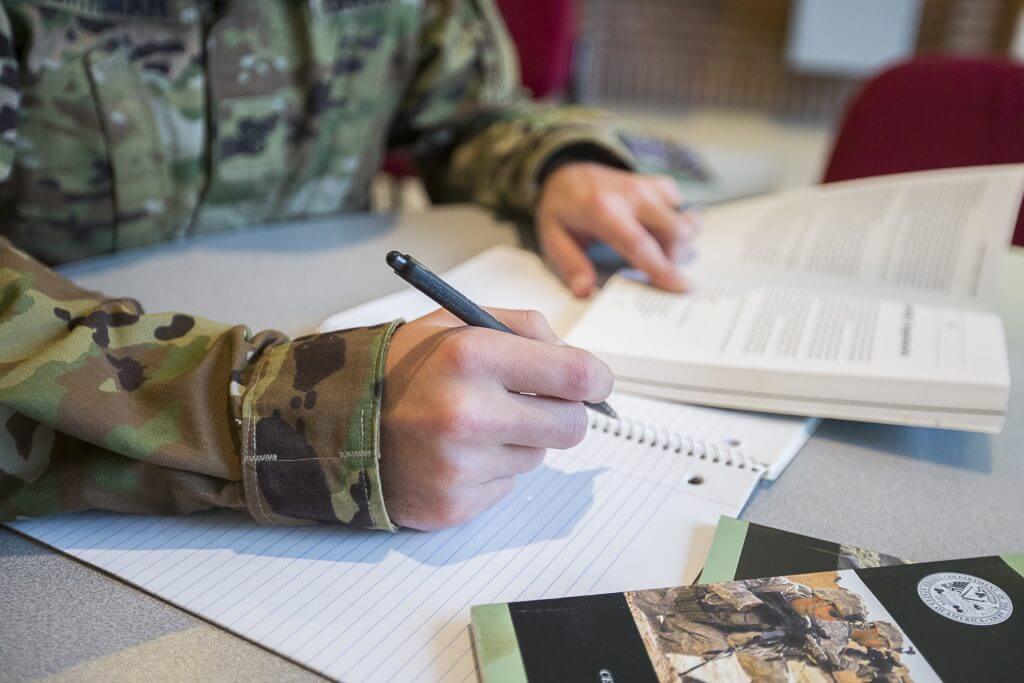by Jennifer G. Williams and Bianca Strzalkowski
President Donald Trump today signed into law the “Forever” G.I. Bill, greatly expanding the education benefits for service members and veterans in all services and branches — and extending eligibility to some of those previously excluded.
“Today our commitment to support and care for the men and women who have served our great nation has been reinforced with the signing of the Harry W. Colmery Veterans Educational Assistance Act of 2017,” said U.S. Rep. Phil Roe, R-Tenn., chair of the House Committee on Veterans’ Affairs, and author of the bill, named for the American Legion commander who wrote the first G.I. Bill in 1944.
The U.S. House of Representatives unanimously passed the bill July 24, with the Senate following in unanimous support Aug. 2, showing rare bipartisan and bicameral agreement and cooperation. The bill went from introduction to being signed into law in just over a month — proponents saying that is because all sides recognize the importance of such a bill.
“As the largest improvement to the G.I. Bill in the last 10 years, the Enlisted Association of the National Guard of the United States applauds the President and Congress for the passage of the Forever G.I. Bill,” says EANGUS Executive Director and retired Army Sgt. Maj. Frank Yoakum.
The expanded benefits are expected to cost $3 billion over 10 years, and officials say they will pay for the increase by decreasing living stipends to G.I. Bill recipients so that they equate with active-duty service members’ basic housing allowance (BAH) for that area.
Veterans Affairs Secretary David Shulkin spoke at a press conference soon after the bill was signed, and said that the U.S. has “spent more than $75 billion so far [on] the Post-9/11 G.I. Bill, and this will give us additional ability to support education in the United States.” An estimated 1.7 million have utilized the Post-9/11 G.I. Bill to date.
Here are some of the updates:
Goodbye to the 15-year Time Constraint
This update eliminates the current 15-year use-it-or-lose-it policy for all current service members and those discharged on or after Jan. 1, 2013. Now veterans will have as much time as they need to return to school and make use of their G.I. Bill benefits.
Good News for Reserve and Guard
“Our nation’s Guard and Reserve members have made great sacrifices, and have earned the right to have their time spent defending our country count towards G.I. Bill eligibility,” said Yoakum.
The new law provides education benefits to Guardsmen and Reservists mobilized under authority 12304b. These service members have not been eligible for such benefits, even though they served alongside active-component troops who received G.I. Bill credit.
“Equal work and sacrifice deserves equal pay and benefits,” said retired Brig. Gen. Roy Robinson, president of the National Guard Association of the United States.
The Pentagon has mobilized thousands of Guardsmen and Reservists under 12304b for missions such as peacekeeping in Kosovo and the Sinai Peninsula since Congress created the authority in 2012. Those troops are retroactively eligible for education benefits under the legislation.
The new law also provides credit toward education benefits for the time Guardsmen and Reservists have spent on medical hold (12301h) since 2008.
Honoring All Purple Heart Recipients
All Purple Heart recipients since Sept. 11, 2001 will be eligible for GI Bill benefits. There has been a three-year minimum service requirement that often adversely affected those on their first enlistment or those in the reserve component.
STEM Incentives
This new law helps veterans take advantage of more non-traditional technology courses. This will also allow veterans and servicemen to learn technical trades and pursue careers in Science, Technology, Engineering and Math. Additionally, service members can extend the benefits of the G.I. Bill by nine months if they pursue a five-year STEM degree.
While the other changes are expected to go into effect early next year, this provision will not be available until August 2019.
Restoring Benefits
The Forever G.I. Bill also helps those service members and veterans who were adversely affected by the recent closings of several colleges and universities — many of which were for-profit and came under fire by the Department of Education and the Department of Defense for unscrupulous practices. But the closings also left many student veterans in a lurch—with credits that wouldn’t transfer to other institutions, which basically wasted their earned benefits.
The new law restores those education benefits to service members who attended any post-secondary institution that closed after January 2015, meaning that students who used their G.I. Bill benefits on now-useless credits at a defunct school can get a “refund” and reuse those benefits to continue their education.
Transferring Benefits
Veterans are already able to transfer their GI Bill benefits to their dependents, but can now also transfer those benefits to other dependents if the initial recipient dies. A dependent who receives a service member’s G.I. Bill benefits can also transfer unused benefits to another dependent after the death of the veteran.
Shulkin also pointed out at the press conference today that if an active duty service member is killed in the line of duty, the benefits can be transferred to an eligible dependent.
Win-Win
Matthew Aulgur, a recent graduate of Brookfield Central High School in Wisconsin, is heading out for boot camp as he starts his eight-year contract with the Marine Corps. He plans on serving four years of active duty and then four years in the Reserves.
Aulgur says he’s happy with the changes made to the G.I. Bill. “I think it’s a pretty decent way to thank service men and women and veterans for their dedication to the country,” he said. “It goes back to what the veterans of WWII were offered…it gives more opportunities for veterans and Soldiers when they come home.”
—Madison Linnihan contributed to this report

